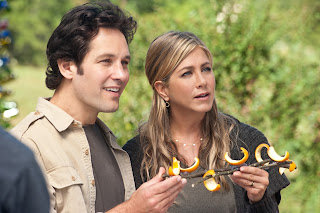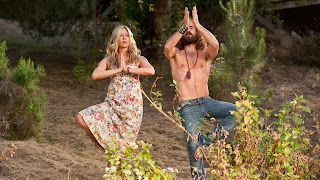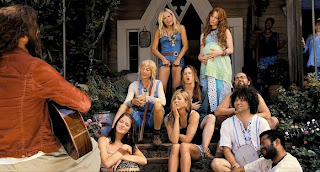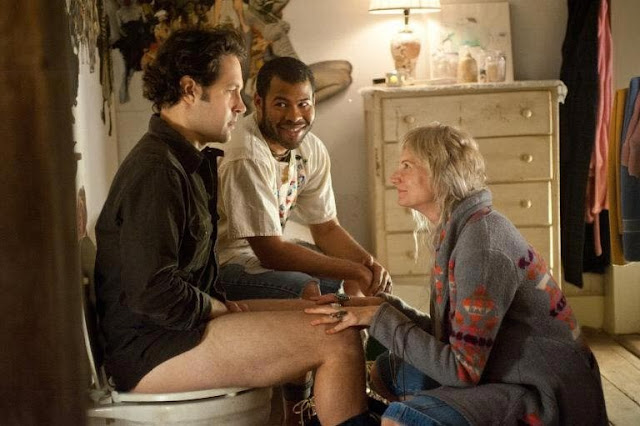Okay, I lied. You are getting an article today. Surprise!
Yesterday I kind of talked your ear off about how awesome Torchwood can be, and why Suzie Costello is amazing, so today we’re going to shift to something radically different. Wanderlust. The screwball, R-rated
comedy about yuppies turned hippies living on a commune. Yep. I saw this in
theaters, folks.
Now, you have to understand that Wanderlust isn’t a bad movie. Not exactly. I wouldn’t really go so
far as to call it a good movie – that would be overstating things a bit. But I
wouldn’t really call it a bad movie either. It’s entertaining, and it has some
moments of genuine emotion, but by and large it’s a silly comedy about a group
of adults acting like little kids.
So, you know, a normal comedy.
What’s different and noticeable about it are two separate
but very related things. First, that it actually has a representative number of
female characters. And second, that these characters are awful.
It passes the Bechdel Test, I believe, but the female
characters in this movie, numerous though they might be, are usually the ones
we laugh at. They’re the ones being silly, getting too into it, “drinking the
kool aid”, whatever. The women are the ones we laugh at, and the men are the
ones we laugh with.
This bothers me, for obvious reasons.
Wanderlust follows
the adventures of George (Paul Rudd) and Linda (Jennifer Aniston), two long
time New Yorkers who are forced to move when George loses his job, and Linda’s
documentary on Penguins who have AIDS isn’t picked up by HBO. Originally they
plan on moving in with George’s brother (Ken Marino), but along the way they
stumble upon a lovely, idyllic commune and decide they want to try something
new.
Of course, once they’re actually living at the commune,
everything is wacky and hijinks ensue. It’s a lot harder to get into the swing
of things than they thought, but both George and Linda make a valiant effort.
George remains a lot more cynical about things, while Linda starts to really
like it there. She makes friends, she enjoys the lifestyle, and she starts to
feel at home.
George, however, feels increasingly cynical and frustrated
with it all, and eventually (after managing to create a whole scandal about free
love and why he wants to sleep with other people but he doesn’t want Linda to
sleep with other people, etc) he leaves.
Only to come back when he decides that he’s not willing to
let Linda be swept off her feet by Seth (Justin Theroux), the charming leader
of the commune who just might be a terrible person. Oh, and they have to save
the commune from being bought by some land developers, because it’s a comedy
about wacky underdogs, so of course they have to.
Like I said, it’s actually a pretty entertaining film. But
that doesn’t mean it’s without fault. Far from it, actually.
As you can probably tell just from the summary, Aniston’s
Linda is the butt of the joke all the way through the film, playing against
Rudd’s George, who is the straight man. Linda is a woman who flounders her way
through life, constantly looking for a sense of purpose and a place to find
herself. She thinks she finds herself in the commune, but then George shatters
that when he tells her that she’s just drunk the kool aid and isn’t really
happy. Because of course she isn’t. That would be terrible. Ugh, hippies.
Linda’s evolution, as she becomes more comfortable at the
commune and more integrated into their society, is the main joke of the film.
We see her doing various unattractive and unpalatable things, which are
supposed to show us how much she’s “fallen”. We are never really supposed to
root for Linda. She’s there for us to laugh at, along with George, to whom
everything is a joke.
Blech.
In addition to all of this, all the crappiness, the other
female characters, though numerous, are all less important and less integral to
the plot than the male ones are. It’s a male character who runs the commune, a
male character who owns the commune, a male character who causes George to want
to move there in the first place, a male character who causes the resolution at
the end, and so on. Even the main impetus of the film, their moving and winding
up at the commune, is all George. He’s the one who loses his job, and he’s the
one who wants to move there.
The female characters, on the other hand, add color. They
add commentary. They are the ones who make the commune feel lived in, but
mostly just add ridiculousness, without ever advancing the plot or the
character development.
And this really sucks. I was actually pretty pumped about this
film, since I love communes and the female cast is pretty freaking amazing. You
have Jennifer Aniston, who can really knock it out of the park when she decides
not to play it safe, Lauren Ambrose, Kathryn Hahn, Malin Ackerman, and more. It’s
pretty amazing.
So how sad to see that with all these female characters, we
still don’t get to have a plot that loves them. A plot that actually uses them
to their full potential, instead of as background decorations or fodder for the
male characters’ machinations. It seriously sucks.
Don’t get me wrong, I’m thrilled to see a mainstream
Hollywood movie with this many roles for female comedians. But I am genuinely
pissed about how it turned out.






No comments:
Post a Comment